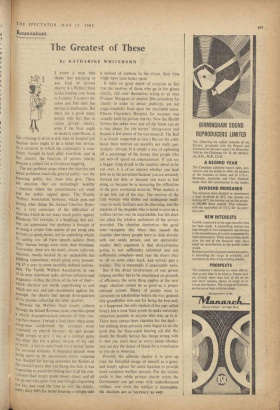Roundabout
The Greatest of These
By KATHARINE WHITEHORN
I KNOW a man who thinks that indulging in any kind 'of private charity in a Welfare State is like lending your horse to London Transport be- cause you, feel their bus service is inadequate. But there are a good many people who feel that to refuse private charity, even if the State ought to make it superfluous, is like refusing to drive a sick man to hospital just because there ought to be a better bus service.
In a situation in which the community is corn- Monty thought to look after everybody and in fact doesn't, the function of private charity remains a subject for acrimonious haggling.
The real problem arises where the charities and social problems touch the general public—not the receiving public, but those who give. There are charities that are exceedingly wealthy '—charities where the commitments are small and the public appeal great. The Family Welfare Association, however, which puts out among other things the Annual Charities Regis- ter, is very conscious of the difficulties of charities which do not make much public appeal. Blindness, for example. is a handicap that any- one can appreciate; but deafness is thought of as being a simple little matter of not being able to listen to good music; not as something which, by cutting you off from speech, isolates from other human beings even more than blindness. Conversely, there are the small, almost ludicrous charities, mostly backed by an unshakable but riddling endowment, which grind away present- ing £5 a year to some carefully defined unfortu- nate. The Family Welfare Association, as one of its most important tasks, advises solicitors and Magnates—within the limits of the law of libel— which charities are worth contributing to and which are not, and can recommend against, for example, the charity that spends three-quarters of its income collecting the other quarter.
Whereas the Welfare State simply collects through the Inland Revenue, many charities spend a wholly disproportionate amount of time rais- ing their money. I raised a loud cheer when some e:ergYman condemned the ceaseless work Pended on church bazaars: • he said people Ought simply to give. I was at a cocktail party the other day for a glossy version of the sale ot work : a fair to raise funds for a nurses' home for overseas students. A thousand pounds were being spent on the decorations alone; someone was thanked for having presented the flowers at the cocktail party that was fixing this fair; it was impossible to avoid the feeling that if all the con- tributors had simply given money direct, and all the people who spent time and thought Organising the fair had used the time to visit the elderly, lobby their MPs for better housing ol• simply take a carload of orphans to the circus, their time might have been better spent.
It takes no great depth of cynicism to feel that the motives of those who go in for glossy charity, fall over themselves trying to sit near Princess Margaret or present film premieres for charity in order to attract publicity, are not single-mindedly fixed upon the charitable cause. (Queen Charlotte's Hospital, for instance, was actually built by private charity. Now the Health Service has taken over and all the funds can do is buy chairs for the nurses' sitting-room and finance a few pieces of far-out research. The Ball is as keenly supported as ever.) But on the other hand, these motives are possibly not really par- ticularly relevant. It is simply a way of siphoning off• a percentage of the money that people who are well-eff spend on entertainment. If you see a beggar lying drunk in the roadway about to be run over, it is of no interest whether you haul him on to the pavement because you are seriously worried for him, or because you want to feel smug, or because he is increasing the difficulties of the poor overtaxed motorist. What matters is to get him out of the way. The motives of the little woman who dishes out inadequate medi- cines to seedy Sicilians may be charming, and the reaction of the magnate who is taxed to provide a welfare service may be unprintable; but this does not affect the relative usefulness of the service provided. The charities themselves—the good ones—recognise this when they squash the impulse that many people have to deal directly with one needy person, and see spectacular results; their argument is that direct-impulse giving is not sufficiently informed and not sufficiently complete—next year the donor may be off on some other track, and nobody gets a holiday. This is reasonable if unpalatable news.
But if the direct involvement of one person helping another has to be abandoned on grounds of efficiency, the same thing applies at the next stage; charities cannot be as good as a proper national system. Plenty of people went to university on scholarships before the war, granted (my grandfather won one for being the best and, as it happened, the only student of his yeAr called Gray), but it took State grants to make university education possible to anyone who was up to it. There have always been charities for the deaf— but nothing done privately even began to do the good that the State-aided hearing aid did. No doubt the Health Service has things wrong with it—but you don't have to worry about whether you can pay the donor of blood for a transfusion as you do in America.
Possibly the ultimate charity is to give up even the beautiful image of oneself as a giver, and simply agitate for more taxation to provide more complete welfare services. For the vicious circle is that while private charity exists the Government can get away with under•financed welfare; and while the welfare is incomplete, the charities are as necessary as ever.






































 Previous page
Previous page